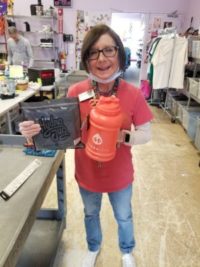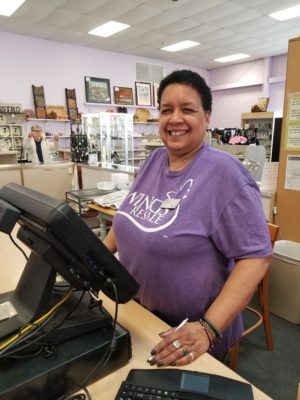It’s that time of year again – decluttering! And, because I just couldn’t get a single video to cover it all, I’m complimenting this week’s feature video as a full article. (Folks like Marie Kondo make a career out of this stuff, after all, and has even turned it into a business empire!) When people start to pare down at the change of a season, one of the questions many folks find themselves asking, after bagging up the things they no longer need, is what to do with it all. Welp, I may have a solution for your dilemma!
Decluttering is good for your spirit, and if it’s that time, it’s good for the sale of your home. (And if you’re ready, call me!) We agents say, “When you put your home on the market, it’s no longer yours. It belongs to someone else, but we just don’t know whose it is yet!” This includes those of you who are looking to find a roommate, to sublease or relet your apartment, or for an inspection. In most of these cases, you’ll have prospective buyers and tenants viewing your home. If someone can’t envision themselves living there, they’re a lot less likely to put in an offer/submit an application. And, that means it’ll take longer to get the deal done: More phone calls, more showings, and another month full of payments. And when it comes to sales especially, the longer a home’s on the market, the lower its perceived value. Watch my video below on smells, too – because like they say, appearances aren’t everything!
So… how do you get started?! Many of you know how wonderful of a program WINGS truly is, helping families to get out of domestic violence situations and restarting their lives. For those of you who’ve watched the miniseries Maid on Netflix, the value of programs like WINGS bring to communities has really driven the message home. So, let’s take a look at what you have to part with that you can donate for their clients and resale shops, and how you can make a difference!

First off, let’s get into how they operate a bit so you get a better sense on how you can help them out. The way WINGS works, at least on the donation side of things, is they sort through the donations, they get prices for the items, and they are displayed in their shops. Sounds pretty easy, right? Nope! It takes a small army of dedicated people to keep the stores going strong. And remember, that’s just the stores I’m talking about – not the services like the housing, counseling, transitioning, or anything like that.

Since they have to first figure out the value of each item, it can be as quick as 15 minutes from drop-off to hitting the showroom floor, and sometimes, it can take an hour or more. This is especially true for unique items; Charlie Williams, the manager at their Schaumburg shop, said how they’ve seen some really amazing items like a medieval-style dining set! So anyway, if an item is missing a tag, and someone would like to buy it, the cashier will have to politely decline the sale.

Also, some of the layout work is done by pros who’ve created displays for department stores- and that’s something I love! Because hey! If you love it on the rack, you’ll probably love it on you (as long as it fits, which they do have dressing rooms!). Their clients get vouchers to shop at their stores, and folks like you and me get to shop there, too! That’s the major thing I like about their shops – that things are just so normal. And classy. And dignified. And fun! Some thrift stores, they just have that depressing vibe about it, am I right? Not WINGS! They make it a true adventure to shop!
Here’s a run down on what they need the most. Be sure to check their website’s list!

- CLOTHES: WINGS needs your clothes for all people and sizes- not just for their clients, but for their children, too, some of whom are tall, teen boys. So yes, your adult men’s clothing is directly needed. And yes, what their clients don’t shop for, you can certainly buy yourself! One thing they ask is you do NOT include hangers. WINGS uses a specific design of hanger for their racks, so they ask you just provide them gently-used, clean clothes in a bag.
- ACCESSORIES: Many of WINGS’ clients are women, and many women’s clothes lack pockets. (Sad fact!) So, of course they happily accept your gently-used handbags, clutches, and totes. Other items are also welcome, such as shoes and jewelry. My visit last week had me drooling!

- HOUSEWARES: If you bought an air fryer and have since realized you no longer use your crock pot, WINGS will happily take it. Maybe you got one as a gift, and you don’t really use it. Or the bread maker. Or the stand mixer. Or the waffle iron. WINGS will take all that, too! Besides small appliances, they’ll also take dishes, utensils, cookware, artwork, and the little things that make your heart and home sing- like in-season décor, tchotchkes, fiction books, records, DVDs, and some children’s toys!
- FURNITURE: Now here’s something you’ll need to call them about picking up instead of dropping off yourself, because hey! It’s heavy! let them come with their truck and help you! And, more importantly, they are limited on what they accept. A couch? Yes! But a sleeper sofa? No. They also do not accept things like office and baby furniture.
Now for items they cannot accept, I do have a few other charities to recommend, and donations these folks accept are also tax-deductible:
- Open Books: Like WINGS, I can vouch for these folks, too, since my Rotary Club has helped them stock their shelves with book donation drives. Here’s what their website states they accept:
“We welcome any sellable book in good condition. This includes fiction, nonfiction, craft books, cookbooks, children’s books, and more! We also accept LPs in good playable condition. Since we give away so many children’s books, we are always in need of more high quality titles.
NOTE: We are no longer accepting CDs and DVDs.” - Blue Star Recyclers: This is a service my Rotary Club regularly sponsors, and it serves three purposes at once: Keeping electronics out of landfills, reclaiming previous metals, and providing full-wage jobs to folks with disabilities, especially those who are on the autism spectrum. For some items, you will need to pay a fee for them to accept, so be sure to ask up front.
- Chicago Furniture Bank: Half of CFB’s clients have a household income under $6,000 a year. Some of you reading this may find that hard to imagine, as there have been several estimates stating the happiness threshold requires about that amount every month. Therefore, especially for many Chicagoans who are transitioning from homelessness, they may find things like basic furniture needs to be well beyond their means. CFB provides their clients with furniture for their entire home, even baby furniture, that is clean, pest-free, and sturdy.
And of course, anything else you have to scale down, there are many other worthy charities out there. You can certainly sell or give those items away on your own, perhaps earning yourself a little bit of cash for something you need. Whatever you choose to do, just remember that doing that thing with love, above all else, will come right back to you!
Thanks again for reading! Take care of yourselves, and check in on your neighbors- especially the elderly and those with disabilities. If you need help with getting by, even if it’s just to have someone to talk to, let me know. I’ll find a way to help. Black Lives Matter.
And please remember, I always have time for you and your referrals!

Lori Dake, an Illinois Licensed Broker
www.LoriDake.com
P: (773) 697-4474
F: (773) 717-5500
E: LDake@KaleRealty.com
Your referral is my greatest compliment!
Kale Realty
2447 N. Ashland Ave., Chicago, IL 60614
www.KaleRealty.com
(312) 939-5253